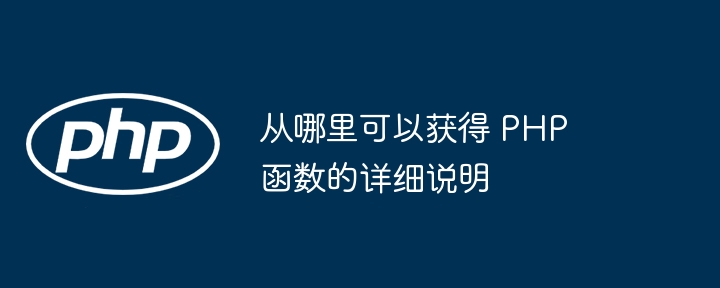Home >Backend Development >PHP Tutorial >Where can I get detailed descriptions of PHP functions?
Where can I get detailed descriptions of PHP functions?
- 王林Original
- 2024-04-12 17:03:02524browse
The PHP Manual is a great resource for finding function details, providing function syntax, parameters, return values, and usage examples. You can drill down into the details of functions like strtoupper() to, for example, convert a string to uppercase by visiting https://www.php.net/manual/en/ or using the Language Assistant (Ctrl Alt F1 / Command Option F1).

Explore the PHP function manual and learn more about function details
Preface
In PHP programming, functions Are reusable blocks of code that perform specific tasks. Familiarizing yourself with the details of functions is crucial as it can help you take full advantage of their capabilities and avoid potential errors. The PHP Manual is the official resource and provides comprehensive documentation of functions.
Where to find the PHP function manual
To access the PHP manual, please visit the following link:
https://www.php.net/manual/en/
You can also directly access the PHP function manual via PHP Language Assistant Access Manual. In the code editor, use the keyboard shortcut Ctrl Alt F1 (Windows) or Command Option F1 (Mac).
Manual content
The PHP manual provides the following information:
- Function description:A brief description of the function, Includes its purpose, syntax, and parameters.
- Parameters: The name, data type and description of each parameter.
- Return value: Details of the value returned by the function, including data type and description.
- Exception: Exception that may be thrown by the function.
- Usage examples: Code examples showing the practical application of the function.
Practical case
Let us take the strtoupper() function as an example. The following is a description of it in the manual:
将字符串中的所有字符转换为大写。
We can learn more about its usage through the following example:
<?php $name = "John Doe"; echo strtoupper($name); // 输出:JOHN DOE ?>
This example demonstrates how to change the string variable $name Passed to the strtoupper() function and echo the result (uppercase string) to the output.
Conclusion
The PHP manual is a great resource for finding detailed descriptions of PHP functions. It provides information about function syntax, parameters, return values, and usage examples. By leveraging the manual, you can expand your understanding of PHP functions and build more robust and efficient applications.
The above is the detailed content of Where can I get detailed descriptions of PHP functions?. For more information, please follow other related articles on the PHP Chinese website!

